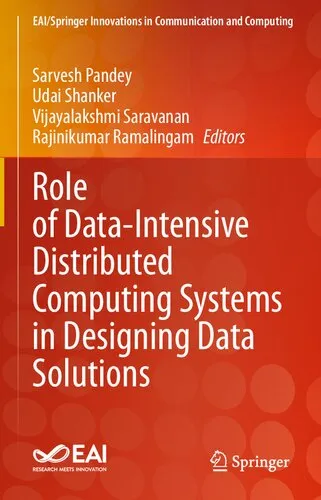Principles of Distributed Systems: 14th International Conference, OPODIS 2010, Tozeur, Tunisia, December 14-17, 2010. Proceedings
3.8
Reviews from our users

You Can Ask your questions from this book's AI after Login
Each download or ask from book AI costs 2 points. To earn more free points, please visit the Points Guide Page and complete some valuable actions.Related Refrences:
Introduction to "Principles of Distributed Systems: 14th International Conference, OPODIS 2010, Tozeur, Tunisia, December 14-17, 2010. Proceedings"
The field of distributed systems serves as the foundation for many technological advancements that drive modern computing. This book, "Principles of Distributed Systems: 14th International Conference, OPODIS 2010, Tozeur, Tunisia, December 14-17, 2010. Proceedings," captures the essence of innovative and cutting-edge research presented during the 14th International Conference on Principles of Distributed Systems (OPODIS 2010). It offers a comprehensive exploration of distributed computing methodologies, algorithms, theoretical foundations, and system designs that address the challenges posed by distributed environments. Through its multidisciplinary approach, this proceedings volume provides a platform for discussing the latest developments in the field, ranging from communication protocols to fault tolerance and security in distributed systems.
Curated from a diverse set of contributions by researchers, practitioners, and thought leaders in distributed systems, the book presents groundbreaking solutions to complex problems that arise within distributed settings. By bridging theoretical insights with practical applications, it offers critical perspectives for professionals and researchers alike.
Detailed Summary
This proceedings volume is a culmination of the research contributions presented at OPODIS 2010, a premier event showcasing advanced distributed systems research. The book includes over 20 full-length papers meticulously reviewed and selected for quality and impact. Organized into thematic sections, the papers delve into a wide range of topics, such as synchronization, fault tolerance, distributed algorithms, system performance optimization, and more.
The conference proceedings placed considerable emphasis on practical and theoretical aspects of distributed systems. Experts contributed novel algorithms to address challenges in system reliability and resource management, while other papers focused on efficient communication mechanisms and their scalability in dynamic networks. Theoretical research covering consensus problems, leader election protocols, and synchronization mechanisms reinforces the strong academic rigor of this book.
The book also introduces state-of-the-art techniques in achieving fault-tolerant designs, adaptable distributed frameworks, and highly scalable architectures, which are pivotal in solving real-world distributed computing problems. Whether you are a researcher seeking to broaden your knowledge or an industry professional dealing with distributed architectures, this comprehensive collection covers the essentials of the field.
Key Takeaways
"Principles of Distributed Systems" offers numerous takeaways for professionals, researchers, and students in computing disciplines. Below are some of the key highlights:
- Comprehensive insights into distributed algorithms and their practical applications.
- In-depth coverage of fault-tolerance strategies critical for improving the reliability of distributed systems.
- Exploration of communication protocols, including scalability and synchronization in large-scale distributed environments.
- Novel approaches to security and privacy in distributed systems, addressing recent challenges related to data breaches and vulnerabilities.
- A strong theoretical foundation in distributed computing topics such as consensus, leader election, and resource optimization.
Famous Quotes
This book features many profound insights and statements by experts in the field of distributed systems. Below are a few memorable quotes from the contributions:
"Distributed systems are inherently complex, but through careful design and rigorous research, we can achieve reliability and scalability in even the most volatile environments."
"In the face of frequent disruptions and faults, the true measure of a system lies in its ability to recover and continue functioning."
"Consensus and synchronization remain the cornerstone challenges of distributed computing—we must tackle these to ensure seamless collaboration among independent entities."
Why This Book Matters
Distributed systems are the backbone of modern computing applications, from cloud platforms to blockchain technologies. This book addresses the gaps and challenges faced by researchers and practitioners in this ever-evolving field, making it a relevant and vital resource for the industry. By shedding light on theoretical advancements and practical achievements, this volume promotes further innovation and collaboration in distributed computing.
The proceedings serve as an essential documentation of the progress made in distributed systems research and act as a reference point for future work. It equips readers with the tools and knowledge required to tackle real-world problems in distributed environments, emphasizing the importance of fault tolerance, scalability, and optimization. Moreover, the concepts discussed here contribute significantly to emerging fields such as decentralized systems, IoT, and edge computing, making this book highly valuable as these fields continue to evolve.
By exploring this book, readers immerse themselves in high-caliber content that bridges the gap between theory and practical application, ensuring its place as a seminal work in the domain of distributed systems.
Free Direct Download
You Can Download this book after Login
Accessing books through legal platforms and public libraries not only supports the rights of authors and publishers but also contributes to the sustainability of reading culture. Before downloading, please take a moment to consider these options.
Find this book on other platforms:
WorldCat helps you find books in libraries worldwide.
See ratings, reviews, and discussions on Goodreads.
Find and buy rare or used books on AbeBooks.
1156
بازدید3.8
امتیاز50
نظر98%
رضایتReviews:
3.8
Based on 0 users review
"کیفیت چاپ عالی بود، خیلی راضیام"
Questions & Answers
Ask questions about this book or help others by answering
No questions yet. Be the first to ask!



